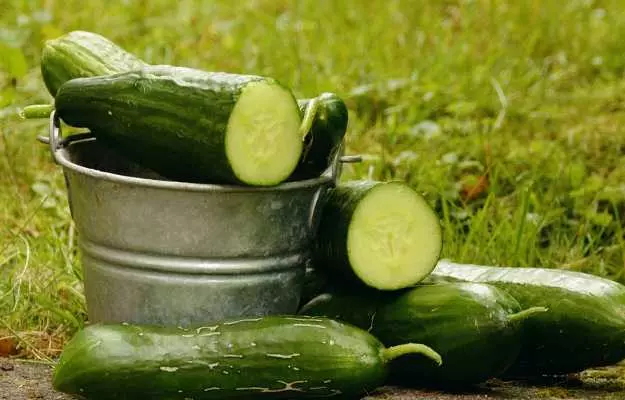Does the phrase “As cool as a cucumber” ring a bell? Truly, we all would agree that there is no pleasure like eating a cool and crunchy cucumber on a hot summer day. Also known by its botanical name, Cucumis sativus, cucumber is very helpful in combating the sizzling summer heat. Cucumber is a member of the gourd family Cucurbitaceae. While they are widely classified as vegetables, cucumbers grow from flowers of cucumber plant and have seeds. Hence, they are actually a type of fruit.
Cucumbers grow in different shapes, sizes, and colours and it can be easily grown in your backyards. On the basis of usage and presence of seeds, cucumber can be of three types. One type is seedless. The other two types are based on their use; either as slices for raw consumption or for pickling. Many different varieties of cucumber are developed from these 3 basic types. They are known to originate from the Indian subcontinent but are presently cultivated all over the world.
The earliest cultivation of cucumber has been dated around 3000 years ago. It was first grown in India and later spread to Europe through Greece and Italy. In fact, traditional Indian medicine has been using cucumber since antiquity. Mentions of cucumber consumption have also been found in the Bible. Presently, it is widely grown all over the world, with China being the major producer for cucumbers and gherkin. The production in China amounts to 77% of total world production.
The juicy crunch of cucumber is enjoyed all over the world. The entire cucumber fruit is consumable and healthy along with its peel and seeds. Cucumber is specifically known for its high water content. But that is not the only upside of eating cucumbers. They contain phytonutrients, which are disease protecting plant chemicals. Besides, the fruit is also rich in minerals like Potassium, Calcium, and various vitamins as well.
Cucumber, popularly known as kheera in India, grows best in warm climates. The cucumber vine does not require much care except regular watering. While cucumber is mostly eaten raw or used in salads and Mediterranean recipes, quite a few Asian dishes are made from cucumber. Water with cucumber slice immersed in it is considered to be a detoxifying and a healthy alternative for plain water.
Some basic facts of Cucumbers
- Botanical name: Cucumis sativus
- Family: Cucurbitaceae
- Common name: Cucumber, Kheera
- Sanskrit name: Urvarukam
- Parts used: Flesh of cucumber, seeds and the skin can all be consumed raw. Cucumbers can also be used in the form of pickles.
- Native region and geographical distribution: Cucumbers are from Ancient India where it grew in the wild. Greeks and Italians introduced it to Europe while it was introduced in the USA by immigrants.
- Interesting facts: Buddhist temple priests in Japan practice cucumber blessing where they pray for a safe summer.
Roman Emperor Tiberius would insist on placing a cucumber on his table all throughout the year. He even used greenhouse-like techniques to cultivate cucumber all through the year.
























